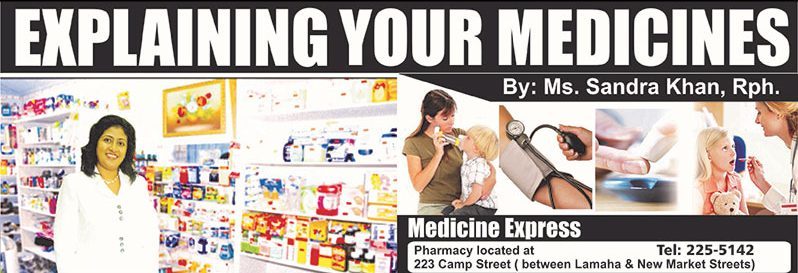PATIENT compliance is where a patient uses a drug, therapy or medical devise correctly or follows through with the prescribed and dispensed regimen resulting in the therapeutic dosage.
So a patient taking the precise quantity of pills or liquid formulation for the correct duration at the right frequency of administration is key. This terminology is also referred to as “patient adherence” which is considered less judgemental and may lead to more positive participatory attitude in creating a responsible patient.
But why is patient compliance important? This phenomenon is not unique to Guyana. It is a universal challenge with varying estimates for non-compliance. According to the CDC, about fifty per cent of patients do not adhere to their regimen for chronic diseases and the number can escalate to two out of three in other treatment categories, according to the Mayo Clinic. The average wastage in resources is about US$290B annually in the USA. It would be interesting to do a local study to quantify our Guyanese patient non-compliance and hence suggest better strategies to reduce wastage of resources and achieve better health outcomes. If the patient visited a private institution then the cost savings will be personal, but in the case of public institutions, the government will be able to maximise their resources. It means that persons will be able to recover more quickly, reduce hospital admissions and, in the best case scenario, extend their life if they were to comply with the prescriber’s instructions. An estimated 125,000 preventable deaths annually in the US is due to patient non-compliance.
What are some of the factors contributing to a non-compliant patient? Some barriers to adherence can be classified into three areas: patient-related, physician-related and health- systems related. However, as a pharmacist, my focus will be on the patient since this is an easier option to make a greater impact. The following discussion demonstrates the patient-related barriers:
1. A private patient socio-economic situation. The patient funds may be exhausted after paying a private health institution for all their tests that no money is left for medication. Other indirect costs such as transportation to the health institution and incidentals, especially for dialysis patients can be a hindrance.
2. A patient’s knowledge, health literacy and psycho-social system play an integral role. So a relative may influence the patient against the treatment due to their beliefs and the patient’s inability to make comprehensive decisions. Or the patient may not actively disagree or suggest otherwise in the doctor’s office due to a lack of confidence or fear of discrimination. Additionally, information from YouTube on a home remedy may be more convincing, causing the patient to disregard all that took place prior to getting their medication at the pharmacy. Ultimately, the doctor may not have noticed the patient’s attitude towards conventional medications was averse.
3. Poor memory or forgetfulness may cause the person to miss a dose or even misplace their medication.
4. The complexity of the regimen prescribed might just be confusing, especially with respect to polypharmacy in the elderly patients. Older patients with a menu of tablets; one before meals, those after meals, some multiple times in the day and some that just have a bad taste can all lead to non-adherence.
5. Undesirable effects referred to as side effects, for example, head swing, cough and drowsiness can become a burden.
6. The relationship or tension between the physician/nurse/ pharmacist and the patient can impede clear and concise communication and follow-up.
So some strategies to address these challenges are:
A. Analyse the patient literacy level and disposition towards their treatment.
B. Talk about side effects anticipated.
C. Encourage memory aids both manual and electronic.
D. Collaborate and follow up with patients.
E. Consider the patients financial burdens.
F. Reduce the complexity of regimen to fewer pills less often.
In conclusion, encouraging the patient to engage in the decision-making process in a blame-free environment is key. Trust between the healthcare provider and the patient is important. Let us on both sides of the desk strive for better health outcomes.
For further advice consult the pharmacist at Medicine Express PHARMACY located at 223 Camp Street, between Lamaha and New Market Streets. If you have any queries, comments or further information on the above topic kindly forward them to medicine.express@gmail.com or send them to 223 Camp Street, N/burg.



.jpg)










